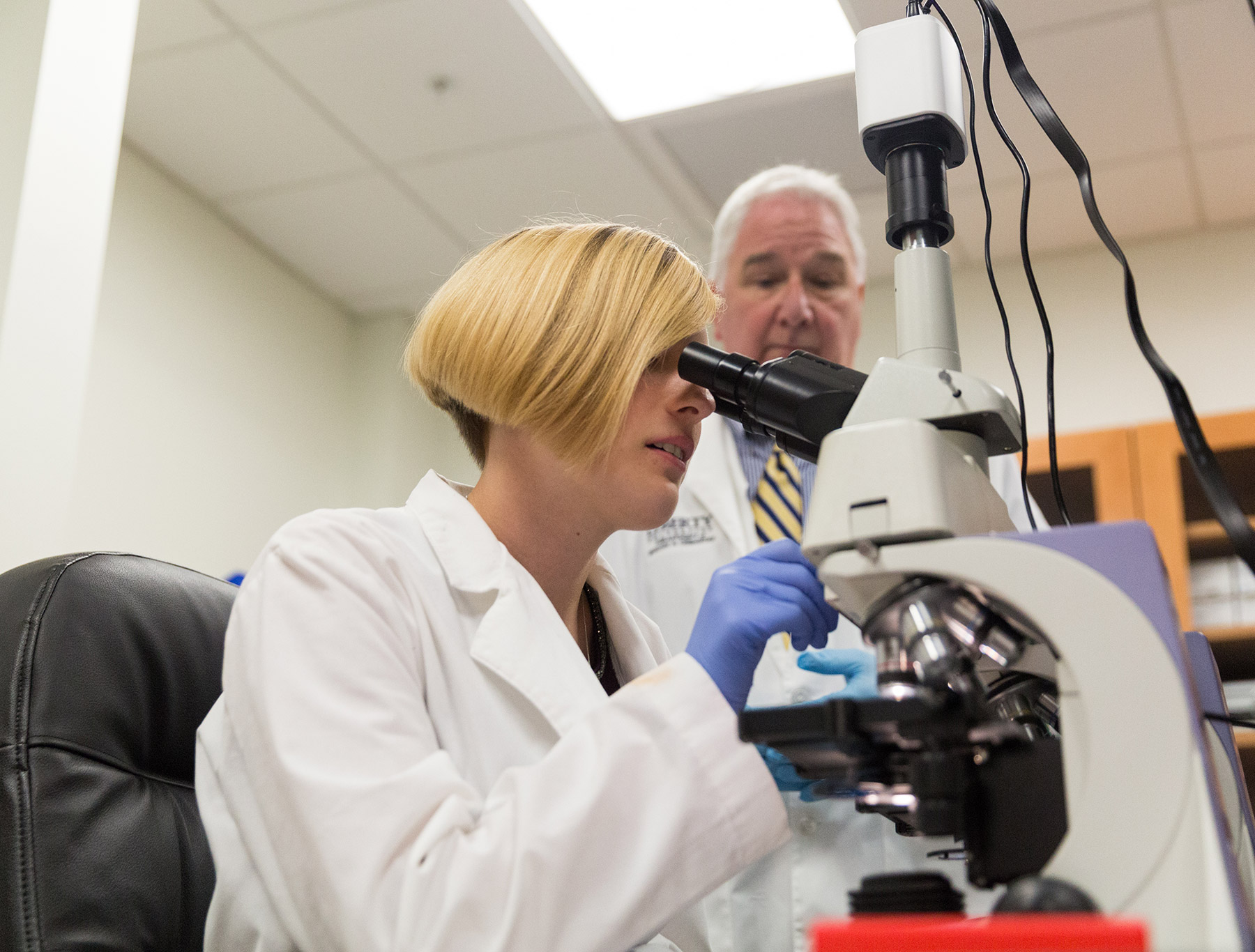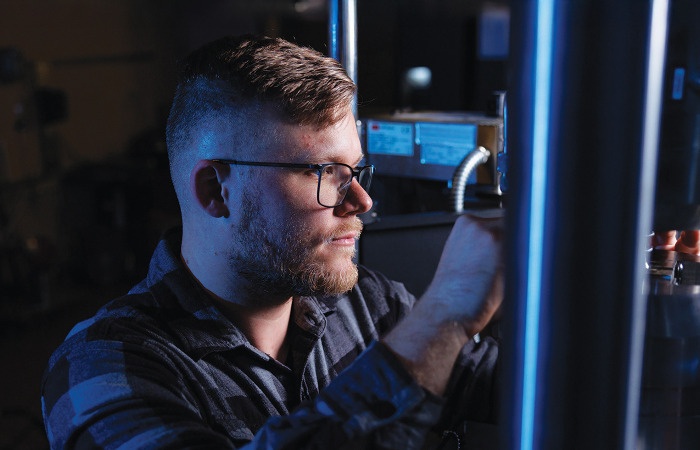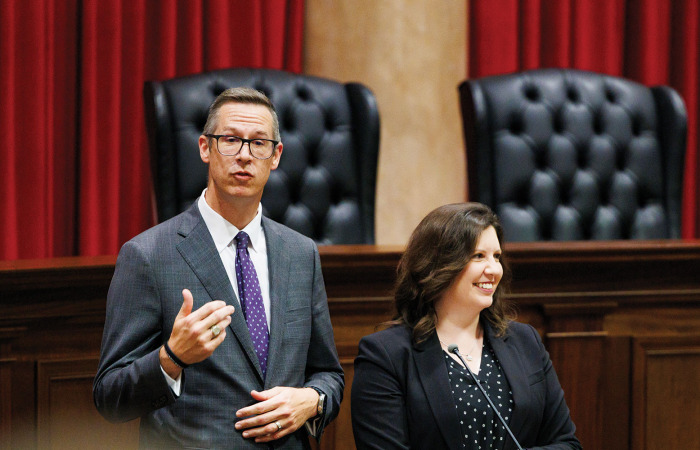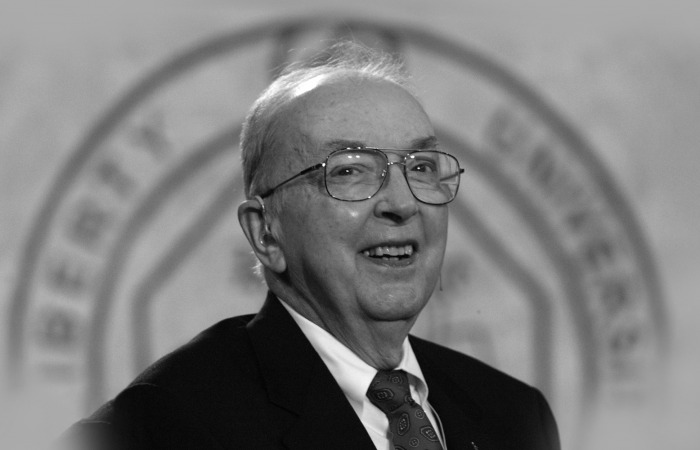DNA expert opens doors for students to participate in groundbreaking projects
Throughout his time at Liberty University, renowned DNA expert J. Thomas McClintock, Ph.D., has sought to establish Liberty’s reputation as a school dedicated to the study of forensic science.
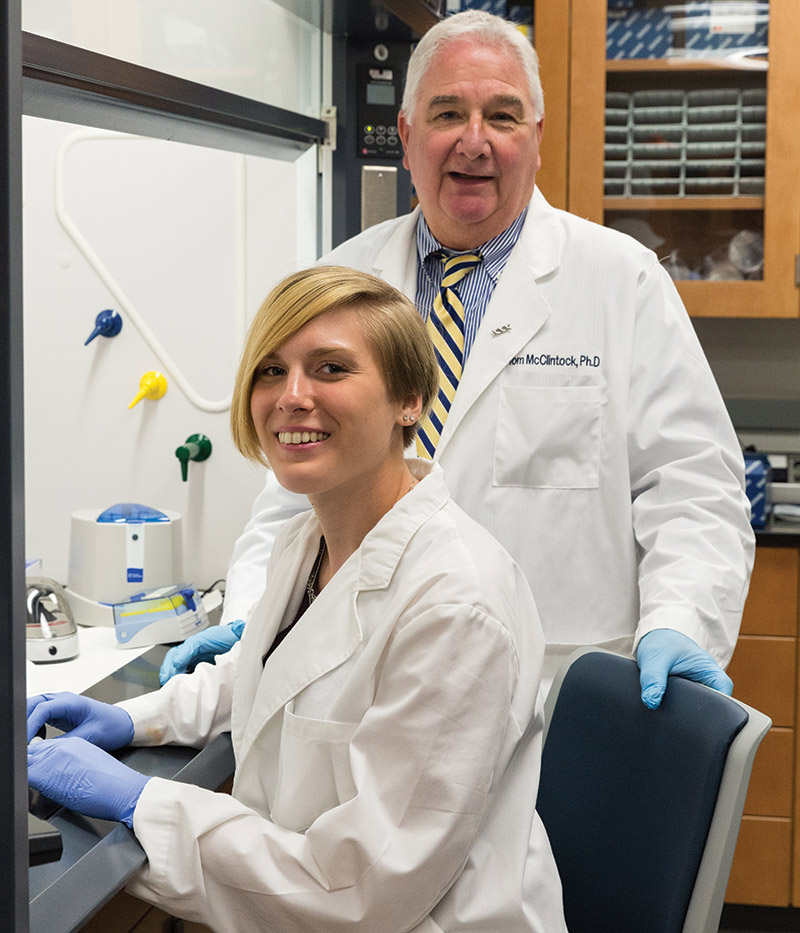
J. Thomas McClintock, director of the forensic science program, works with May graduate Kristin Jones to analyze DNA evidence in the Center for Natural Sciences’ forensics lab. (Photo by Kaitlyn Becker Johnson)
The professor of biology and director of the forensic science program has been recognized for both his professional work and for his role in the classroom.
In February, McClintock was featured on ABC’s “20/20” for his part in an investigation of the 1985 murders of Nancy and Derek Haysom, who were brutally killed in their Bedford County home, just a few miles from Liberty’s campus. Their daughter, Elizabeth, and her former boyfriend, Jens Soering, are serving time for the double murder. DNA evidence — never presented in the case — could shed new light on Soering’s longstanding claim of innocence. (Soering initially confessed but later recanted, saying he only confessed to cover for his girlfriend.) McClintock was called up last summer to analyze DNA results of blood found at the scene. On “20/20,” he explained that he found at least one unidentified sample.
As one of the nation’s foremost DNA experts, McClintock has provided his expertise in other high-profile investigations, including the 2008 case of missing Florida toddler Caylee Anthony.
McClintock describes his work as “justice through science,” and he is passionate about helping the innocent become exonerated. That passion has led him to spearhead efforts to bring a Center for Justice (similar to the Innocence Project) to campus. The nationwide project enlists the help of organizations to examine DNA evidence in both cold and active cases where the accused claims to have been wrongly convicted. In collaboration with the Liberty University School of Law and the Helms School of Government’s criminal justice program, students would have a chance to make a difference in people’s lives while also gaining relevant experience in their fields. He hopes to begin the program in Fall 2019.
McClintock has also helped students gain hands-on experience through simulation exercises. Last October, students uncovered bones, collected insects, and searched for other evidence as part of a simulated crime scene that involved an animal carcass that had been placed in the forest days before. McClintock also organized a simulated bioterrorism attack, where students engaged with local emergency responders and used their skills to decipher a biological agent.
In and out of the classroom, students say that McClintock is not only a dedicated teacher but also a compassionate mentor who takes time to invest in the lives of each of his students.
He has involved his students in many significant research projects. Recently, students analyzed blood samples taken from the Hillsman House in Rice, Va., corroborating that the building served as a Union field hospital during the last major Civil War battle fought in Virginia. They have been able to generate male DNA profiles from samples more than 151 years old.
In another project, recent graduate Kristin Jones worked with McClintock in the Center for Natural Sciences’ state-of-the-art labs to examine tissue and hair samples from the deformed skulls of mummies unearthed from an ancient burial site in Peru. The two worked to solve the mystery of this “cone head” population’s genetic origins and dispute the claim of other scientists that the cranial deformation points to another human species, an unknown hominid species, or an alien.
“It was such an honor to work with Dr. McClintock because I came into the program thinking I was going to just take the classes and graduate and go on and do whatever,” Jones said. “But when he asked me to come on as a researcher, I was like, ‘Me? Why?’ But it’s been amazing ever since and, honestly, I wouldn’t be going where I am if it weren’t for him and the research opportunity.”
Jones recently completed an internship at the office of the chief medical examiner in Washington, D.C., and has been accepted into a master’s program in forensic science at Virginia Commonwealth University.
Students have also been working with the Virginia Department of Forensic Science in Roanoke, Va., to test certain chemical compounds detected in sexual assault casework. Their research could assist law enforcement officers in determining if a particular over-the-counter product may have been involved in a drug-facilitated sexual assault.
McClintock said he believes in building mentor relationships to empower students to succeed in college and in their careers.
“My goal as an educator is to encourage my students to think clearly and logically and to challenge them according to their individual strengths and needs,” he said. “Each student has been blessed with talents and abilities that are often untapped. God has given these students spiritual gifts for the express purpose of building His kingdom. As a teacher, I try to recognize and identify these abilities and build on these strengths by providing opportunities for students to communicate and use their knowledge and gifts.”
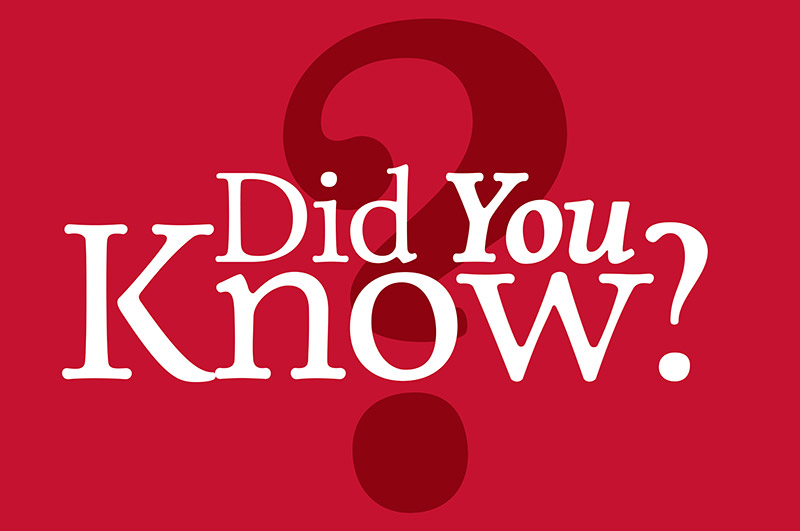 The Bachelor of Science in Forensic Science is offered under the Department of Biology & Chemistry in the School of Health Sciences. In the spring, the department launched a doctoral degree program, the Ph.D. in Anatomy & Cell Biology.
The Bachelor of Science in Forensic Science is offered under the Department of Biology & Chemistry in the School of Health Sciences. In the spring, the department launched a doctoral degree program, the Ph.D. in Anatomy & Cell Biology.
